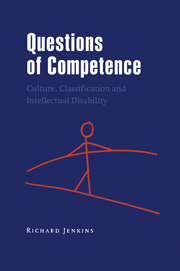Book contents
- Frontmatter
- Contents
- List of contributors
- 1 Culture, classification and (in)competence
- 2 Mental disability in the United States: an interactionist perspective
- 3 (In)competence in America in comparative perspective
- 4 Risk, resilience and competence: parents with learning difficulties and their children
- 5 Constructing other selves: (in)competences and the category of learning difficulties
- 6 Work, opportunity and culture: (in)competence in Greece and Wales
- 7 Slow cookers and madmen: competence of heart and head in rural Uganda
- 8 States and categories: indigenous models of personhood in northwest Greenland
- 9 Learning to become (in)competent: children in Belize speak out
- 10 Towards a social model of (in)competence
- Bibliography
- Index
5 - Constructing other selves: (in)competences and the category of learning difficulties
Published online by Cambridge University Press: 16 January 2010
- Frontmatter
- Contents
- List of contributors
- 1 Culture, classification and (in)competence
- 2 Mental disability in the United States: an interactionist perspective
- 3 (In)competence in America in comparative perspective
- 4 Risk, resilience and competence: parents with learning difficulties and their children
- 5 Constructing other selves: (in)competences and the category of learning difficulties
- 6 Work, opportunity and culture: (in)competence in Greece and Wales
- 7 Slow cookers and madmen: competence of heart and head in rural Uganda
- 8 States and categories: indigenous models of personhood in northwest Greenland
- 9 Learning to become (in)competent: children in Belize speak out
- 10 Towards a social model of (in)competence
- Bibliography
- Index
Summary
The Western medico-psychological model of learning difficulties assumes that intellectual incompetences are basic to this classification. However, on closer examination, the category of people with learning difficulties is so heterogeneous, as regards the competences of its members, how they perceive themselves and how they are regarded by others, as to appear to have no genuine basis of cohesion, certainly not in specifiable intellectual abilities and disabilities. This raises the question of whether there are other reasons for their categorisation in this manner.
This question can initially be addressed by considering how categorisation as someone with learning difficulties affects other social identities, in particular the achievement of social adulthood. The various difficulties that people with learning difficulties face in acquiring implicit recognition as adults in Western society, many of which are only marginally related to intellectual incompetences, raise questions about the relationship of these two social identities: learning difficulties and adulthood. There are very great differences between these two identities both in the ways in which they affect the lives of young adults with learning difficulties and the manner in which they are discussed and understood by people with learning difficulties and those close to them. Among the group of young people with learning difficulties whom I came to know in the course of research on their transition to adulthood, most claimed that they were indeed adults. They and their parents participated in a discourse about their adulthood which originated in a normalising philosophy of care promulgated mainly by the social services.
Information
- Type
- Chapter
- Information
- Questions of CompetenceCulture, Classification and Intellectual Disability, pp. 102 - 124Publisher: Cambridge University PressPrint publication year: 1999
Accessibility standard: Unknown
Why this information is here
This section outlines the accessibility features of this content - including support for screen readers, full keyboard navigation and high-contrast display options. This may not be relevant for you.Accessibility Information
- 3
- Cited by
